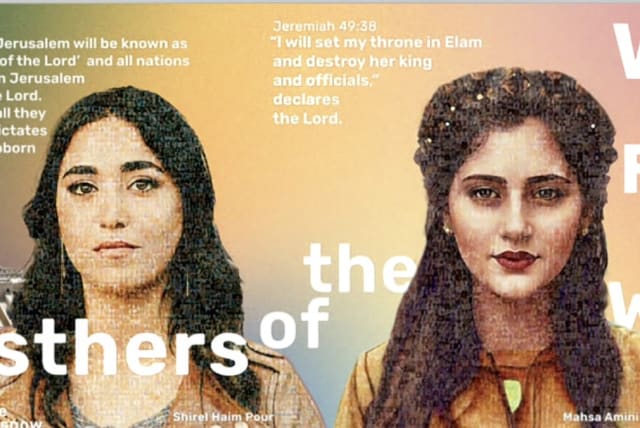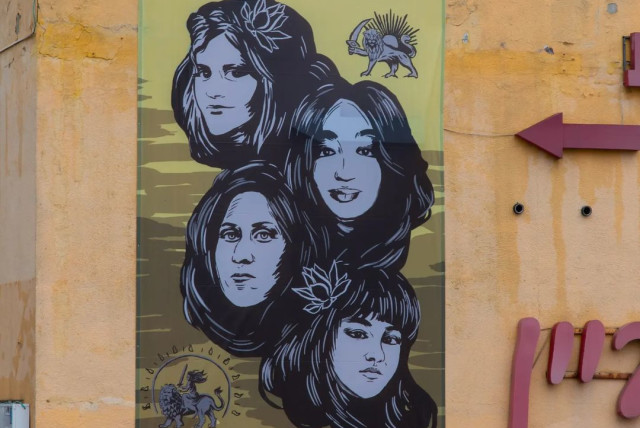New Jerusalem mural memorializes Iranian ‘Women Memorial Warriors’

“Not fearful of the enemy, Shirel knew her duty and did it. I want the women of Iran and the women of the Middle East to look at Shirel as a fearless woman who stood up to a terror organization.”
A mural was unveiled on the outside wall of the Museum of Tolerance in Jerusalem on Sunday in solidarity with Iranians who have been imprisoned, killed, and otherwise oppressed by the ayatollah regime.
This tribute mural is the eighth in Israel as part of a collaborative series with Christian Iranian American filmmaker and entrepreneur Hooman Khalili. Under the internationally famous banner of “Women, Life, Freedom”—a rallying call for ongoing anti-regime protests in Iran—the newest mural places a particularly timely focus on support for Iranian women just as Israeli forces are embroiled in a war with Hamas, an Iran-funded terror proxy organization.
Lionizing two women with Persian roots, Iranian Mahsa Amini and Israeli Shirel Haim Pour, the mural features them standing side by side, wrapped by the call to action, “Esthers of the world, rise up.” Behind them is the banner “Women, Life, Freedom,” printed in Hebrew, English, and Persian. Adorning the top of the mural are two Bible verses: Jeremiah 3:17, in which God says he will have his throne in Jerusalem, and Jeremiah 49:38, in which God says he will have his throne in Elam, the ancient name of Iran where the Book of Esther takes place.
Amini, a 22-year-old Kurdish-Persian-Iranian, was beaten to death on Sept. 16, 2022, by the Iranian “morality police” for imperfectly hiding her hair underneath her hijab. Her death—one of many similar tragedies—sparked massive popular uprisings across Iran.
Amini’s mosaic portrait is composed of 7,000 tiled portraits memorializing the 1,020 individuals who lost their lives or faced imprisonment during the past year of protests in Iran.
Meanwhile, 20-year-old Staff Sgt. Haim Pour was a Persian Jewish soldier in the Israel Defense Forces who was killed on Oct. 7 during the Hamas massacre, when terrorists overran the Nahal Oz military base where she was serving in the Gaza border observation unit.
It was her last weekend on base before she was scheduled to be honorably discharged from military duty. According to her family, despite not being on duty at the time of Hamas’ attack, she chose to head to the war room and help send out warnings anyway.
Losing a fighter and a pure soul
At her funeral, Haim Pour’s brother, Barak, said, “You chose to fight and carry out your mission instead of hide. You chose to help, and because of you and your work, the world gained many pure souls, but lost a pure soul that was like no other.”
Speaking to The Media Line, Barak said that his sister last texted at 10:53 in the morning of Oct. 7 from the command center in Nahal Oz, saying that she was “OK, and safe, and loved us.”
It was the last the family heard from her, as the base was set on fire when the terrorists couldn't make their way in.
Haim Pour’s image, like Amini’s, is made up of 7,000 tiles with the faces of the 1,200 people who were murdered Oct. 7 as well as the 240 who were taken hostage.
Feeling moved by the unveiling, Barak said he wanted to tell his sister's story and show her face to the world in any way he could. He felt the unveiling of the mural was a beautiful event to memorialize the women warriors, his sister among them, alongside Amini.
Speaking with The Media Line, Khalili spoke about the importance of this project from different perspectives.
“One of the goals of this mural is to make Shirel [Haim Pour] as recognizable as Mahsa Amini. In Shirel, you have a true courageous Persian female warrior,” Khalili said.
Additionally, with the words “Esthers of the world rise up” written behind the two women, Khalili pointed to the biblical story of Purim and the unity between Jews and Persians, which the story represents.
Esther was a Jewish woman who became queen in the Persian empire, and “Shirel is a modern-day Esther,” Khalili continued. “Not fearful of the enemy, she knew her duty and did it. I want the women of Iran and the women of the Middle East to look at Shirel as a fearless woman who stood up to a terror organization funded by the Islamic regime of Iran. May her [Shirel’s] story be embraced by the world, and may she inspire 100 million Middle Eastern women to fight.”
As for the timing and placement of these murals, Khalili gives thanks to partners in Israel like Jerusalem Deputy Mayor Fleur Hassan-Nahoum who told Khalili that she wanted the world to know that Jews stand with the freedom-fighting women of Iran.
“Now more than ever, the women of Israel and the women of Iran stand side by side against terrorism and misogyny,” Hassan-Nahoum told The Media Line. “This mural represents the women heroes who stood up for their country and their principles and paid the ultimate sacrifice with their lives. We will remember them, look up to them, and fight the cruel Islamic fundamentalism that murdered them.”
By contrast, Khalili pointed to other nations in the region. “Do you know how many murals there are in support of the Persian women in Afghanistan or Iraq or Jordan or Lebanon or Qatar or Saudi Arabia? The answer is zero; Israel is the only country in the Middle East standing with the Iranian women.”
Meanwhile, Khalili also emphasized popular support for Israel among the Iranian people, despite the ayatollah’s best efforts.
“Never forget everyone, the Persians have been the loyal friends of the Jews for 3000 years” and that the two nations were only enemies “for less than 50 years. Let us not allow 50 years to outweigh 3,000,” he said.
This latest mural was a collaborative effort, produced by Khalili and designed by Justin McGinnis, Ryan Tsuen, Kent Jordan as well as Khalili.
Khalili began erecting murals in Israel in January 2023 after an invitation from the mayor, who praised his involvement in the US-based Murals for Freedom.
The first Israeli mural was hung in Jerusalem’s Talpiot neighborhood and also features Amini along with Sarina Esmailzadeh, Fereshteh Ahmadi, and Nika Shakarami—four of the earliest protest victims in Iran.
Khalili plans a total of 18 murals in Israel.
Jerusalem Post Store
`; document.getElementById("linkPremium").innerHTML = cont; var divWithLink = document.getElementById("premium-link"); if (divWithLink !== null && divWithLink !== 'undefined') { divWithLink.style.border = "solid 1px #cb0f3e"; divWithLink.style.textAlign = "center"; divWithLink.style.marginBottom = "15px"; divWithLink.style.marginTop = "15px"; divWithLink.style.width = "100%"; divWithLink.style.backgroundColor = "#122952"; divWithLink.style.color = "#ffffff"; divWithLink.style.lineHeight = "1.5"; } } (function (v, i) { });

